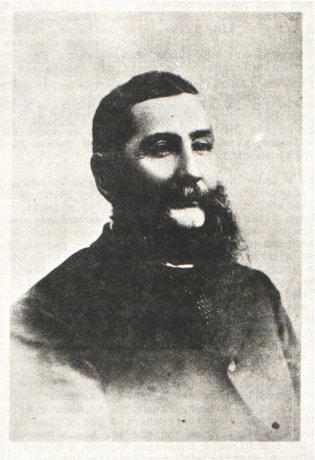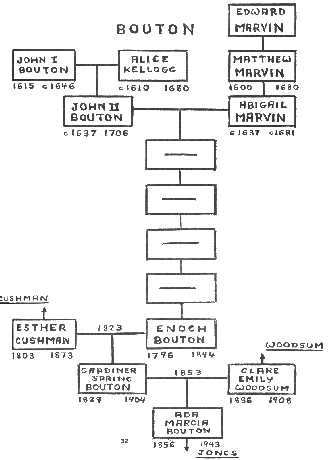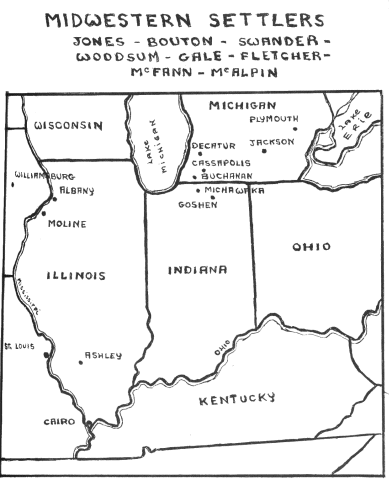About my name: Bouton
|
"What Kind of A Name is Bouton?"
The name "Bouton" is originally a
surname. My father was a genealogist and he wanted to keep the name in the
family so he gave it to me.
I pronounce it "BOW-ton." (BOW as in "take a bow," rhymes with "wow.") If you can pronounce the French faint nasal n well, "BOO-tahn" is appropriate. Just don't call me "BOO-ton." It sounds like I'm married to my cousin in a trailer park.
My father spent 20 years researching our family history and published his findings in a book: The 1367 Direct Ancestors of the Jones Boys by Ltc. Wesley Gale Jones (retired.) There are copies in the Library of Congress, Washington, D.C.; New England Genealogical and Historical Society, Boston, Ma.; and Society of Genealogy, London, England. For those of you who are curious about the Bouton family history in particular, I've posted chapter three of my father's book below.
For more information on the Bouton Family visit the Bouton Family Genealogy Forum at http://genforum.genealogy.com/bouton/.
~~ Bouton Jones
|
Chapter 3: "The Bouton Family"
From The 1367 Direct Ancestors of the Jones Boys
by Ltc. Wesley Gale Jones (retired)
General:
All of the material in this chapter is from The American Ancestors of Margaret Esther Bouton Thom and William John Thom.
Bouton, pronounced Boo-tone, is a French surname. The name is said to be derived from "de Butheon," a commune in the department of the Loire in the arrondissement of Monthrison, written le Bouton, not de Bouton. In old French the word signifies closed up or fastened. The present meaning is Button.
John I Bouton:
From all my sources the fact is clear that all of the families of Bouton and Boughton in America descended from John I Bouton of Norwalk, Connecticut.
The immigrant of 1635 appeared on the register of passengers as "Jo. Bowton." Apparently nothing of his past was known before sailing. A John Bowton appeared in Hartford some months later and married Alice Kellogg. It has been assumed by all authorities that they were one and the same person. The barque Assurance embarked from Gravesend, England, in July, 1635, Master—Isaac Bromwell, reaching Boston in December, 1635. The 76th name on a list of 174 male and 40 female passengers is "Jo. Bowton." When John Bouton or Jo. Bowton reached Boston, he appears as a single man of twenty years. He did not become of record in Boston as it is probable that he left very shortly for the new settlement on the Connecticut River, then called Newtown, later renamed Hartford. Alice Kellogg was married to John I Bouton about 1636 when she was about twenty-six and he was twenty-one years of age. They had three children, all born in Hartford. These were John II, Richard and Bridget. The first John Bouton must have died about 1645 or 1646.
John II Bouton:
At the time of his father's death the younger John was a small child and his mother married Matthew Marvin, who was evidently a good father to the three Bouton children. His boyhood was spent at the Marvin home in Hartford, and when he was about thirteen years old was taken to Norwalk when Matthew Marvin went there in 1650 with his family. Clear legal proof exists that John II Bouton of Norwalk was the son of John I Bowton of Hartford. In the first book of town records of Norwalk his marriage is recorded: "John Bowten of Norwake tooke to wife Abigail Marvin the daughter of Math Marvin Senr of the same, January 1, 1656." The name of John II Bouton of Norwalk appears many times in the town records. During King Philip’s War of 1675 and 1676, John II was a deputy representing Nowalk in the General Assembly. He served as one of the special jurors in the trial of several women as witches early in the 1690s. It was concluded if the accused were bound, thrown in the water and sank, they were innocent; if they floated, they were guilty. John’s service at Hartford was the longest rendered by any deputy from Norwalk in the seventeenth century by virtue of having been elected ten or more terms, so that his name was placed on the honor roll of the Colonial Dames of America.
(Note: To explain King Philip’s War mentioned above. By 1671 many Indian tribes, which controlled approximately a third of the present state of Massachusetts, felt themselves encircled by the English, who forced them to disarm. The Wampanoag tribe under "King Philip" allied with the Nipmuc, Narraganset, and Podunc tribes in 1671. In 1675 the English drove Philip into the Pocasset swamp and turned against the Narragansets. The Indians counter-attacked in January 1676, but were defeated by autumn.)
The sons of John II Bouton and Abigail Marvin were John (1659-1705?), Matthew (1661), and Joseph (c.1674). John II had two other sons, Thomas and Richard, but it is not known whether Abigail or a second wife, Mary Stevenson, was the mother. John II Bouton was born about 1636 or 1637, and died in 1706. For generations all of the Bouton descendants lived in Fairfield County, Connecticut, moving then west to Westchester County, the adjacent county in New York. John II’s son, Matthew, spelled his name Boughton and all his descendants did likewise.
Matthew Marvin:
Matthew, youngest son of Edward and Margaret Marvin, was baptised in St. Mary’s Church, Great Bentley, Essex, England, on March 26th, 1600. He was first married to Elizabeth, who was born about 1604. The Marvin family, which included five children, sailed from London in the "Increase," Robert Lea, Master, and landed her passengers in New England during June 1635. Matthew Marvin and family were in Boston for a few months. He was one of the very first of the group that founded Hartford, arriving there in November, 1635. The monument in Hartford in honor of the founders lists his name as one of the "twelve earliest emigrants whose names are known" and who formed the company known as "Adventurers." Matthew’s first wife lived for five or six years after arriving in Hartford, and two daughters, Abigail and Rebecca, were born there. Abigail was born about 1637 or 1638 and died about 1681. It appears probable that Matthew Marvin died early in 1680.
Enoch Bouton:
Reverend Enoch Bouton was born in New York, January 4th, 1796, was married to Esther Cushman at Preble, Cortland County, New York, on September 1st, 1823, was a Presbyterian missionary preacher at Center Farinington, Ohio, and later at Goshen, Indiana, and died there on August 3rd, 1844, at the age of forty-eight years. There is not one word in the mass of data that throws any light on the place of his birth or the names of his parents. There is, however, no doubt that he is a descendant of John II Bouton of Norwalk and Matthew Marvin who are the forebears of all the Boutons and Boughtons in America.
On November 1st, 1824, the Court of Common Pleas of Trumbull County, Ohio, licensed "Reverend Enoch Bouton, Pastor of the Presbyterian Church at Youngstown, Ohio," to perform marriages. On June 30th, 1825, he was commissioned Chaplain of the 1st Regiment, 4th Brigade, of the 1St Division of the Ohio militia. His family was living in Farmington, Ohio, from 1827 to 1837, but during the summer season he was a roving missionary covering eastern Ohio from Lake Erie to the Ohio River. In 1943 Farmington was a very small village about sixteen miles north of Warren and about thirty miles from both Cleveland and Ashtabula.
On August 30th, 1827, Enoch Bouton petitioned for the establishment of a post office at Center Farmington which was granted, and on February 15th, 1828, he was appointed postmaster, and held that office for several years. In the summer of 1830 he spent seven weeks travelling to and from a Presbyterian convention in Philadelphia—by boat to Buffalo, canal boat to Utica, wagon to Homer and Albany, steam boat to New York, and stage to Philadelphia.
Enoch had a brother named Sands Bouton, who with his eldest son Henry, lived at Warren, Ohio. The Reverend spent 1837 through 1839 in western Ohio, 1839 through 1843. in Plymouth, Michigan, and 1841 through 1843 in Albany, Illinois. He was the pastor of the church in Goshen, Indiana, from 1843 until his death on August 22nd, 1844. On November 10th, 1840, he secured three grants, a total of two hundred acres, in Michigan, from President Van Buren. On April 15th, 1844, he bought for eight hundred dollars lot number 184 in Goshen, Indiana.
The Reverend’s children included Mary Elizabeth Bouton (June 3rd, 1844—September 19th, 1845), Gardiner Spring Bouton (born Farmington, Ohio, February 3rd, 1829; died on April 3rd, 1904), Thomas Fassett Bouton (June 30th, 1831—April 24th, 1897), and Newland Cushman Bouton (February 4th, 1836—October 19th, 1862).
Gardiner Spring Bouton:

Gardiner was born February 3rd, 1829, in Farmington, Ohio, to the Reverend Enoch Bouton and his wife, Esther Cushman Bouton, both of New York state. The young couple had been sent by the Presbyterian Board of Missions to the "wilds of Ohio" as the region across the mountains was at that time characterized. Fragments of the diary of the young wife are pathetic, not because of reprinning at hardships, but rather because of what is unwritten and between the lines; -- of the death of "two darling babes," -- of the slow recovery from the same devastating fever of the missionary husband, and then the joyful note of the birth of a son! The young mother prays that they may realize, that "this child is lent to us."
Two younger sons were born during their residence in Farmnington. Later their field of labor extended into Illinois and Indiana, the death of Reverend Enoch occuring at Goshen, Indiana. In August of 1844.
The son Gardiner, then in his sixteenth year, was the mainstay of his widowed mother and the two younger brothers, and his schooling was interrupted. We learn of him next as apprenticed to a printer in Cincinnati, with an annual stipend of forty dollars and a suit of clothes. This training seems to have determined the trend of his later life, as on the conclusion of his apprenticeship he associated himself with the next younger brother, Thomas F., and the Bouton brothers were for the rest of their lives successful businessmen, save for occasional tries at side lines. For instance, while connected with the Jackson (Michigan) Patriot they thought they saw big money in a boot and shoe contract, employing prison labor. They emerged from this venture with little more than their own "boots and shoes," and were glad to return to printers ink.
At Christmas time of 1853 occured the marriage in Cassapolis, Michigan, of Gardiner Bouton and Clare Emily Woodsum, a young girl of seventeen years of age, of New England stock, as shown by D.A.R. records. The following year saw the marriage of Thomas F. Bouton; his bride also a Michigan girl.
There was a third Bouton brother, Newland Cushman, unmarried, with whom the mother made her home. After the death of this young man in 1862, the families decided to seek a milder climate, and about 1865 moved to southern Illinois, settling first on a farm near a small town, Ashley. As farming was an untried art to these wielders of "composing sticks" and handlers of job presses, the senior partner soon left the younger brother with the plows and the sheep and hied himself to nearby Cairo and a printing office. Tales are told of the packed valise at the foot of the bed, to be grabbed at the flood signal. Cairo, at the confluence of the Mississippi and Ohio Rivers, with its insufficient levee system, was subject to periodic overflows. The Ashley farm becoming tiresome, the brothers again went back to their mainstay by purchasing an old established southern Illinois paper, the Jonesboro Gazette, which Thomas F. Bouton conducted successfully until his death in 1897. He was well and favorably known in the political life of southern Illinois.
Having seen his brother established, Gardiner Bouton in 1868 moved with his family to St. Louis, Missouri, at that time a successful competitor with Chicago. He was connected for a time with leading newspapers, the Missouri Republican and the St. Louis Post Dispatch, until his launching out for himself into what became a lucrative printing and publishing business, dealing with periodicals and magazines of good quality. As has been noted, his schooling had been interrupted, but he always maintained that a printing office furnished the elements of a liberal education. At the age of fifty, his investments, mostly in real estate, being profitable, he retired from active business and moved to a suburb of St. Louis, the present site of Washington University. His death occurred on Easter Sunday, April 3rd, 1904.
Notwithstanding his name and background, Gardiner Spring Bouton was not a church-going person. He was wont to say that the fifteen years of missionaring had drained his store of piety, but the daughters were encouraged from their earliest years to regular attendance at Sunday school and church services. As his daughters remember him, Gardiner Spring Bouton was essentially a home-keeping husband and father, a lover of music, an inveterate reader of good literature, with a well-stored mind. The favorite diversion of the Bouton home evenings was for "Pa" to read aloud, preferably, if his was the choice, from Shakespeare, Milton, Macauley, Dickens, Moore and Scott. The "Waverley Novels" and "The Lady of the Lake" still seems to belong to him and to bring back the echoes of his voice.
Ada Marcia Bouton:
The children of Gardiner Spring Bouton and his wife, Clare Emily Woodsum were Ada Marcia Bouton and Margaret Esther Bouton. M argaret Esther was born in Jackson, Michigan, on July 7th, 1862, and married William John Thom (born Waynesburg, Pennsylvania, on August 30th, 1861; died in Chicago on January 6th, 1926). Ada Marcia was born in Cassopolis, Michigan, March 4th, 1855; married Henry Candee Jones at St. Louis on January 4th, 1882; and died in Buffalo Wyoming, on March 31st, 1943.
|
Additional Etymological Note on the Name "Bouton"
The OED lists "bouton" as a particular type of pearl button, or "the button-like end of a honey-bee's tongue." "Button" is of argued descent, probably teutonic originally. It seems to have meant "knob" originally, and came directly into the french from the late latin verb "bottare" (to thrust).
~~ Bouton Jones with the help of Hilary Hultman
|



 visitors since May 12, 2001
visitors since May 12, 2001